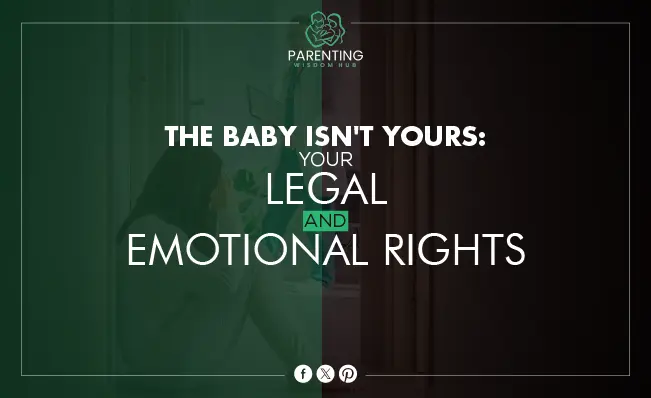Introduction
Are you a parent who has painfully realized your baby isn’t yours? It makes it normal to feel disoriented and puzzled. Naturally, you want to know how to proceed legally and emotionally. This blog post will explain your rights in a paternity dispute, including where to receive emotional assistance and how to negotiate understanding and agreement. Learning about your legal rights can help you navigate this difficult time, whether you don’t know what to do or need aid with overwhelming emotions.
Read more The Baby Isn’t Yours: How to Deal with the Devastating News
Understanding the Definition of a Non-Biological Parent
Non-biological parents are involved in their children’s lives and usually have parental rights and duties. In adoption, step-parenting, or when mistaken for the biological parent, this person may have to do this. Non-biological parents’ rights vary by region, circumstances, and child-rearing involvement. It would help if you had a lawyer for your case.

Rights and Responsibilities to the Child in Different Legal Situations
Right to Visitation:
If they contributed to the child’s upbringing, non-biological parents may be granted visitation rights. Phone calls, in-person meetings, and other methods may be used. The child’s best interest should always guide visiting rights decisions.
Financial Obligations:
Depending on the circumstances, a non-biological parent may be financially accountable for a kid. This may involve paying child support, medical bills, or school costs. This depends heavily on the jurisdiction and circumstances of each case.
Custodial Rights:
Non-biological parents may be given primary custody in some cases. The caregiver’s bond with the child, their ability to offer a safe and caring environment, and the child’s preferences if they’re old enough are factors.
Decision-making Rights:
A child’s non-biological parents can make important rearing decisions. These decisions may involve the child’s education, healthcare, and religion. To use this privilege, you usually require official guardianship or custodial rights.
Emotional Obligations:
Even if it is not required by law, non-biological parents frequently have a fundamental emotional obligation to the child, and this is especially true if they have been actively involved in the child’s life for a considerable amount of time. This may entail offering emotional support, direction, and a stable environment.
Emotional Support for Those Who Feel Betrayed
You may struggle to cope with your feelings after becoming a non-parent. Normal feelings include anger, rejection, sorrow, and perplexity, but emotional support is essential now. Telling trusted family or friends about your problems may help. They bring comfort and perspective. Therapists and family counselors help control emotions. Survivor support groups help you feel supported and understood during this difficult time.

Challenges of Establishing Visitation and Custody for Non-Biological Parents
As a non-biological parent, establishing visitation and custody rights can be a difficult and time-consuming process due to the following factors:
Legal Precedents:
Legal precedents nearly always favor biological parents in custody and visitation cases, making it harder for non-biological parents to get custody or visitation. This is especially true in biological-connection-friendly jurisdictions.
Proving Significant Relationships:
A parent, not the child’s biological parent, must demonstrate a meaningful and long-standing relationship with the child. This can include giving evidence of the amount of time spent together, shared experiences, and emotional relationships, which can be challenging and emotionally draining work.
Child’s Wishes:
When determining custody and visiting rights, it is common practice to consider the kid’s wishes, particularly if the child is older. Suppose the child is resistive to maintaining a relationship with a non-biological parent. In that case, it cannot be easy to convince a court that doing so is in the child’s best interests and that the relationship should be maintained.
Negotiating with the Biological Parents:
It is common for non-biological parents to be required to negotiate with the kid’s biological parent or parents, who may be unwilling to permit visitation or shared custody of the child. This might result in conversations that are both stressful and contentious.
Financial Expenses:
In most cases, pursuing visitation or custody rights requires engaging in court fights, which can take a long time and cost much money. The financial burden of obtaining their rights may be overwhelming and impossible for non-biological parents.

Knowing When to Seek Professional Advice and Representation
Because of the complexities associated with instances involving non-biological parental rights, it is very necessary to obtain the counsel and representation of a legal practitioner. Consider the following important aspects of the situation:
Legal Expertise:
Hiring a family law attorney can help you negotiate the procedural components of the parental rights law and provide a full grasp of your rights and duties. This is especially helpful given the complexity of the parental rights law. They can provide direction to help you arrive at well-informed conclusions regarding your situation.
Accurate Assessment:
If you hire a professional, they can provide an informed assessment of your situation and explain the various results and dangers involved in pursuing your case. This assists in establishing expectations that are in line with reality and prepares you for any potential legal processes that lie ahead.
Protecting Your Rights:
During legal proceedings and conversations, an experienced attorney can actively protect your rights and will also watch out for your best interests. This is of the utmost importance, particularly if you foresee potentially problematic contacts in the child’s future with their biological parents.
Supportive Care:
Family law attorneys collaborate closely with various legal and mental health experts, including therapists, counselors, and social workers. They can provide referrals to these resources, ensuring you can access emotional and psychological assistance at this difficult time.
Financial Planning:
Legal fights may come with significant costs. A trustworthy attorney will be open and honest about the prospective costs of your case and will assist you in making appropriate financial plans. They could also give you tools to help handle the financial ramifications of the legal procedure or point you in the direction of such services.

Effective Strategies for Communicating with Biological Parents in Regards to Co-Parenting
Open and Honest Communication:
Establishing a regular mode of communication with the biological parents that is open and truthful is of the utmost importance. This requires you to be open and honest about your goals, worries, and objectives, as well as the expectations you have of yourself. At first, you might feel uneasy about it. However, this could open the way for cooperation and better understanding between everyone involved.
Respect Boundaries:
Acknowledge and honor the boundaries that the biological parents established. This will aid in establishing trust and reduce the likelihood of future confrontations. Please consider that they, too, have feelings and worries of their own, which must be acknowledged.
Prioritize the Child:
Everyone concerned is responsible for putting the child’s welfare ahead of any personal conflicts or problems they may be experiencing. The child’s emotional, psychological, and physical well-being should be considered when making decisions.
Consistency:
When it comes to co-parenting, having consistent methods of parenting is essential. To ensure that both parents send the same message to the child, finding common ground on important issues like discipline, schooling, and morals is important.
Mediation or Counseling:
When communication is likely extremely difficult or controversial, involving an impartial third party, such as a mediator or a counselor, may be beneficial. They can offer the essential direction to allow efficient communication to resolve issues.

Resources Available for Those Raising Babies Not Their Own
Online Support Groups:
There are support groups online for children whose parents are not real. These groups give people a safe place to talk about problems, share experiences, and give each other help. They can give you a lot of emotional support and useful advice on dealing with the unique issues of non-biological parenting.
Legal Aid Services:
Legal aid programs that are free or very cheap can help non-biological parents understand their rights and fight for them. These groups help with things like adoption, visitation rights, and child custody; they can also represent people in court if needed.
Counseling and Therapy Services:
Non-biological parents might benefit from getting help from a counselor or therapist. Professionals in this field can help you deal with stress, talk to your children’s biological parents, and build good relationships with your children.
Parenting Classes:
Parenting in-person and online lessons can teach non-biological parents much about how children grow and develop and how to be good parents. Some useful things that might be taught in these classes are discipline, communication, and dealing with common behavior problems.
Local Community Organizations:
Many groups in the community help non-biological parents by providing training programs, financial aid, and fun family activities. These groups can help non-biological parents feel less alone on their trip by giving them a support network.
Conclusion
Non-biological parenting is complex and requires aid, compassion, and patience. Non-biological parents can fight for their rights and develop good relationships with their children and biological parents by seeking professional help, communicating openly, and using resources. Making close connections with children that improve their and their parents’ lives is worth the arduous route. Though the travel differs, their love and care are as profound and wonderful.


